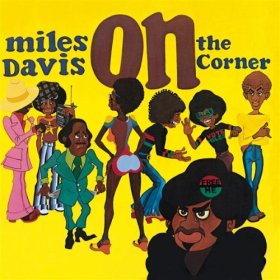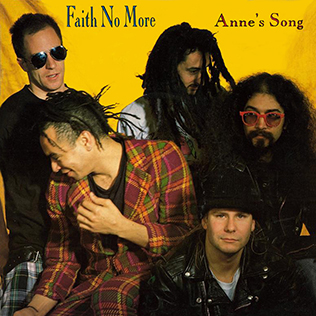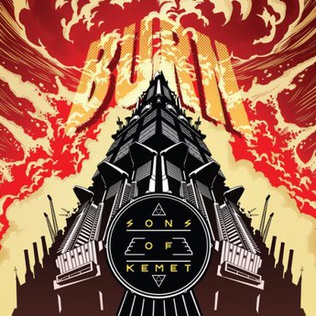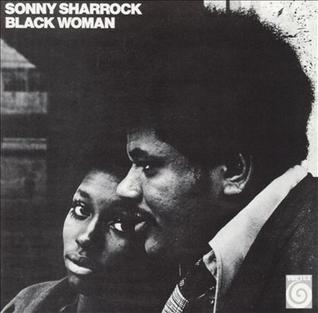"Giant Steps" is a jazz composition by American saxophonist John Coltrane. It was first recorded in 1959 and released on the 1960 album Giant Steps. The composition features a cyclic chord pattern that has come to be known as Coltrane changes. The composition has become a jazz standard, covered by many artists. Due to its speed and rapid transition through the three keys of B major, G major and E♭ major, Vox described the piece as "the most feared song in jazz" and "one of the most challenging chord progressions to improvise over" in the jazz repertoire.

On the Corner is a studio album by the American jazz trumpeter, bandleader, and composer Miles Davis. It was recorded in June and July 1972 and released on October 11 of that year by Columbia Records. The album continued Davis' exploration of jazz fusion, and explicitly drew on the influence of funk musicians Sly Stone and James Brown, the experimental music of Karlheinz Stockhausen, the free jazz of Ornette Coleman, and the work of collaborator Paul Buckmaster.

The loudness war is a trend of increasing audio levels in recorded music, which reduces audio fidelity and—according to many critics—listener enjoyment. Increasing loudness was first reported as early as the 1940s, with respect to mastering practices for 7-inch singles. The maximum peak level of analog recordings such as these is limited by varying specifications of electronic equipment along the chain from source to listener, including vinyl and Compact Cassette players. The issue garnered renewed attention starting in the 1990s with the introduction of digital signal processing capable of producing further loudness increases.

Bradford Alexander Mehldau is an American jazz pianist, composer, and arranger.

"Anne's Song" is a 1988 single by American band Faith No More, taken from their 1987 album Introduce Yourself. Written by band members Billy Gould and Roddy Bottum, the song describes an acquaintance of theirs from New York, and her circle of friends. The single was produced by Matt Wallace and Steve Berlin and released by Slash Records.
"Intruder" is a song written and performed by the English rock musician Peter Gabriel. The song was the first to use the "gated reverb" drum sound created by Hugh Padgham and Phil Collins, with Collins performing the song's drum part. The gated drum effect was later used in Collins' own "In the Air Tonight", and appeared frequently through the 1980s, on records such as David Bowie's "Let's Dance" and the Power Station's "Some Like It Hot".

Get the Blessing are a jazz rock quartet based in Bristol, England. The band formed in 2000 when Jim Barr and Clive Deamer (drums), who had played with Portishead, joined Jake McMurchie (saxophone) and Pete Judge (trumpet) over their appreciation of Ornette Coleman.
Elizabeth Bernholz, better known by her stage name Gazelle Twin, is an electronic music composer, producer and musician who is currently based in Leicestershire, England.

Phronesis is a jazz trio, formed in 2005 by Danish bass player Jasper Høiby. The piano trio is completed by British pianist Ivo Neame and Swedish drummer Anton Eger. Phronesis have been described by Jazzwise magazine as "the most exciting and imaginative piano trio since e.s.t. - Esbjörn Svensson Trio". In 2017 the band was awarded Jazz Ensemble of the Year in the APPJAG Parliamentary Jazz Awards.

Burn is a debut studio album by British jazz band Sons of Kemet released on 9 September 2013 by Naim Records label. This album, and their running series of critically acclaimed performances, led to them winning the 'Best Jazz Act' in the 2013 MOBO Awards.

Black Woman is the debut album by American jazz guitarist Sonny Sharrock, recorded in 1969 and released on the Vortex label. In 2000, it was reissued by the Collectables label, paired with the Wayne Henderson album People Get Ready.

10 Years Solo Live is a recording by jazz pianist Brad Mehldau. It contains solo piano tracks from 19 concerts in Europe during the period 2004–2014.

The Cherry Thing is an album by vocalist Neneh Cherry and jazz trio The Thing, consisting of saxophonist Mats Gustafsson, bassist Ingebrigt Håker Flaten and drummer Paal Nilssen-Love. It was recorded in 2011 and released the following year by Smalltown Supersound.

Cuong Vu Trio Meets Pat Metheny is a studio album by Vietnamese jazz trumpeter Cuong Vu and American jazz guitarist Pat Metheny, with additional musicians Stomu Takeishi on fretless five-string bass guitar, and Ted Poor on drums. The album was released on May 6, 2016 via Nonesuch label.

Ruler Rebel is a studio album by American jazz trumpeter Christian Scott released on March 31, 2017 by Ropeadope Records. The album is the first installment of The Centennial Trilogy, with Diaspora and The Emancipation Procrastination being the second and the third ones respectively.

Hudson is a jazz album by drummer Jack DeJohnette, bassist Larry Grenadier, keyboardist John Medeski and guitarist John Scofield. The album was released on June 9, 2017 by Motéma.

Black Midi are an English rock band from London, formed in 2017. Their most recent line-up consisted of lead vocalists and multi-instrumentalists Geordie Greep and Cameron Picton, along with drummer Morgan Simpson. Between 2017 and 2020, the band also included guitarist Matt Kwasniewski-Kelvin. Following his departure, the trio were frequently joined by multi-instrumentalist Seth Evans and saxophonist Kaidi Akinnibi, both as session musicians and during live performances. Their name is derived from the Japanese electronic music genre black MIDI, though their own music has no relation to it, instead incorporating styles such as math rock, progressive rock, post-punk, and avant-jazz.

Relative Pitch Records is an American independent record label specializing in free jazz and avant-garde jazz, free improvisation, and experimental music. Run by Kevin Reilly, Relative Pitch has been ranked among the top jazz record labels in The New York City Jazz Record and DownBeat year-end lists, and praised by publications and organizations including The Guardian, NPR Music, The Brooklyn Rail, and in Bandcamp Daily's label profile, "Relative Pitch is Built on Enthusiasm for Experimental Music".

Windmill Tilter: The Story of Don Quixote is an album by trumpeter Kenny Wheeler, his first as a leader. It was recorded in March 1968 and was released in 1969 by Fontana Records. On the album, Wheeler, credited as "Ken Wheeler," is joined by the John Dankworth Orchestra. In 2010, the album was reissued by BGO Records in remastered form. In 2021 it was reissued on vinyl as part of Decca's British Jazz Explosion series, remastered and re-cut from the original master tapes by Gearbox Records.

The Utopia Strong are a British electronic band formed in Glastonbury, England in 2018. The group consists of Steve Davis, Kavus Torabi, and Michael J. York. They released their self-titled debut album in 2019 and their second, International Treasure, in 2022.
















